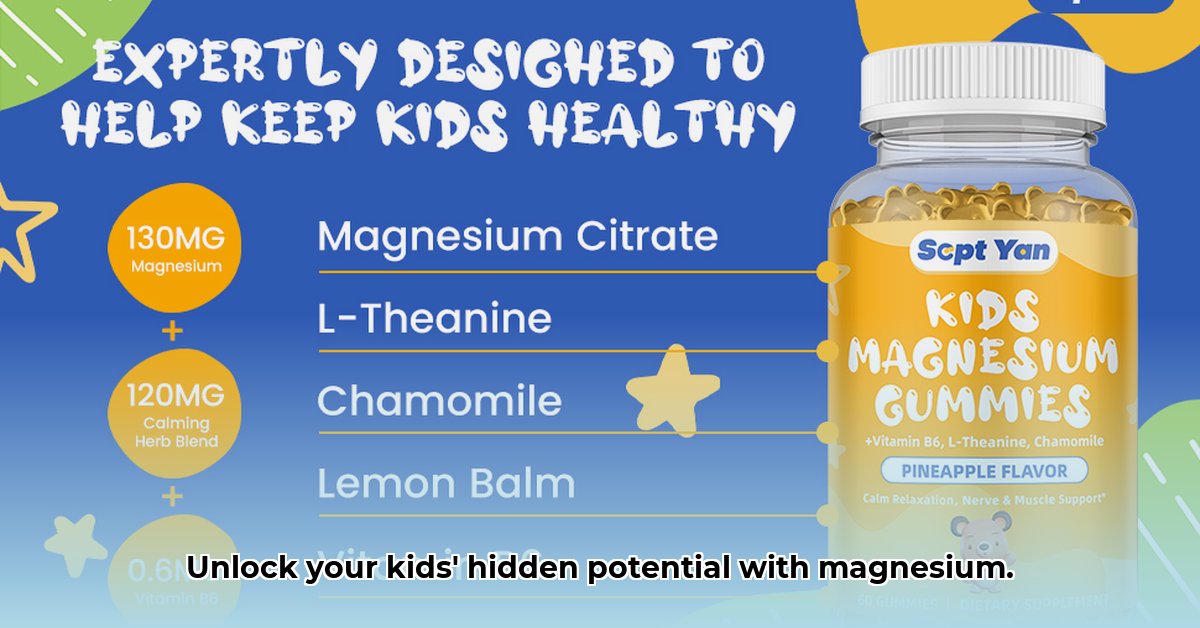Is your child often struggling with sleep, mood swings, or muscle aches? They might be deficient in magnesium, a crucial mineral for their overall well-being. This guide provides a comprehensive, step-by-step approach to ensuring your child receives adequate magnesium through a balanced diet and, when necessary, safe supplementation, always under the guidance of a healthcare professional. Learn how to seamlessly incorporate magnesium-rich foods into their daily meals, gain insights into different types of supplements, and confidently support your child’s health and development.
Magnesium: The Unsung Hero for Your Child’s Health
As parents, we constantly strive to provide our children with the best possible care, and proper nutrition plays a vital role. Magnesium often gets overlooked, yet it’s an essential mineral that significantly impacts a child’s energy levels, mood, sleep quality, and overall health. Let’s delve into how to ensure your kids get the magnesium they need for optimal growth and development.
Why is Magnesium So Important for Growing Children?
Magnesium is a true workhorse, participating in over 300 biochemical reactions in the body. It plays a vital role in:
- Bone Health: Magnesium is essential for strong bones and teeth, working in harmony with calcium and vitamin D.
- Muscle Function: It supports healthy muscle function, helping to prevent cramps and improve coordination, crucial for active kids.
- Nervous System: Magnesium contributes to a properly functioning nervous system for a calmer, more focused child by regulating neurotransmitters.
- Energy Production: It’s involved in converting food into energy, keeping your child active and alert throughout the day.
- Brain Development and Mood: Adequate magnesium intake supports healthy brain development and contributes to a positive mood, potentially reducing irritability and anxiety.
In short, adequate magnesium intake helps children thrive!
Recognizing the Signs of Potential Magnesium Deficiency
Subtle changes in your child’s behavior or physical well-being can indicate a possible magnesium deficiency. Be on the lookout for these common signs:
- Increased Irritability: Sudden bouts of grumpiness, heightened sensitivity, or easy frustration.
- Persistent Fatigue: Constant tiredness or lethargy, even after sufficient sleep, suggesting a lack of energy.
- Muscle Cramps or Twitching: Unexplained muscle aches, twitches, or nighttime leg cramps that disrupt sleep.
- Sleep Problems: Difficulty falling asleep, restless sleep with frequent waking, or general sleep disturbances.
- Changes in Appetite: Significant shifts in eating habits, including loss of appetite or unusual cravings.
- Difficulty Concentrating: Struggling to focus on tasks, exhibiting inattentiveness, or experiencing learning difficulties.
It’s important to remember that these symptoms can arise from various factors. Observing several of these signs consistently warrants a conversation with your pediatrician to determine the underlying cause.
Delicious Ways to Boost Magnesium Intake Through Food
Before considering supplements, focus on incorporating magnesium-rich foods into your child’s diet. This is generally the safest and most effective way to increase their magnesium levels. Prioritize whole, unprocessed foods as the foundation of a child’s healthy eating habits.
Here are some kid-friendly, magnesium-packed options:
| Food Group | Specific Foods | Fun Ways to Serve Them! |
|---|---|---|
| Dark Leafy Greens | Spinach, Kale, Collard Greens | Blend into smoothies, finely chop into omelets, or hide in pasta sauce. |
| Legumes | Beans (kidney, black, pinto), Lentils | Serve in soups, stews, chili, or as a tasty dip with vegetables. |
| Nuts & Seeds | Almonds, cashews, pumpkin seeds, chia seeds | Mix into trail mix, sprinkle on yogurt or salads, or create homemade energy bars. |
| Avocado | Avocado | Mash into guacamole, spread on toast, or blend into creamy smoothies. |
| Whole Grains | Brown rice, quinoa, whole-wheat bread | Serve as side dishes, incorporate into grain bowls, or use for sandwiches. |
| Other Good Sources | Bananas, sweet potatoes, dark chocolate (in moderation) | Offer as snacks, incorporate into baked goods, or enjoy as a healthy dessert option. |
Make it fun and engaging! Get your kids involved in meal planning and preparation. Let them choose a magnesium-rich ingredient to add to a recipe or help prepare a healthy snack.
Magnesium Supplements: When are They Necessary for Kids?
Magnesium supplementation should always be discussed with your pediatrician first. They can evaluate your child’s individual needs, consider their medical history, and determine if a supplement is truly necessary. A doctor can also rule out any other potential underlying causes for your child’s symptoms. Never self-medicate your child.
If your pediatrician recommends a magnesium supplement:
- Form Matters: Several forms of magnesium exist, including citrate, glycinate, oxide, and L-threonate. Each form has different absorption rates and may be better suited for specific needs. Your doctor will recommend the most appropriate form for your child based on their individual requirements.
- Start Low and Go Slow: Begin with a very low dose, strictly adhering to your doctor’s instructions. Gradually increase the dosage only if recommended by your pediatrician, and closely monitor your child’s response.
- Be Vigilant for Side Effects: Some children might experience mild side effects such as a slightly upset stomach or loose stools when starting a new magnesium supplement. Contact your doctor immediately if these side effects persist or if you observe any other unexpected or concerning symptoms.
Remember, supplements are not intended to replace a healthy diet. They should be used as a complement to a well-balanced eating plan.
Potential Drawbacks and Important Safety Precautions
While magnesium supplements are generally considered safe for children when taken as directed, excessive intake can lead to unwanted side effects, including digestive issues like diarrhea, nausea, and abdominal cramping.
Always adhere to your pediatrician’s recommended dosage, and never exceed the suggested daily limit. Contact your doctor or seek immediate medical attention if you suspect your child has taken an overdose of magnesium.
A Holistic Approach to Magnesium and Your Child’s Health
Adequate magnesium intake is undoubtedly crucial for supporting your child’s overall well-being. Prioritize a nutritious diet rich in magnesium-rich foods and consult with your pediatrician before introducing any supplements.
A balanced approach, combined with open communication with healthcare professionals, is the key to raising happy, healthy kids! Regular check-ins with your pediatrician or a registered dietitian can help ensure your child’s nutritional needs are being met.
Supporting Kids with ADHD: The Role of Magnesium
Key Takeaways:
- Magnesium plays a critical role in brain function and may assist in managing ADHD symptoms in some children.
- Dietary changes should be the primary focus, with supplementation considered only under the strict supervision of a qualified healthcare provider.
- Safe magnesium supplementation in children with ADHD necessitates careful consideration of the appropriate dosage and form.
- Close monitoring of your child’s response to magnesium is essential for effective management of attention deficit hyperactivity disorder.
- A comprehensive and holistic approach, integrating diet, lifestyle modifications, and potentially supplements, offers the most promising outcomes.
Understanding the Link Between Magnesium and ADHD
Magnesium functions as an essential cofactor in numerous bodily processes, many of which are crucial for optimal brain function and healthy development. Its role becomes particularly significant for children diagnosed with ADHD, where neurotransmitter activity may be imbalanced. Magnesium aids in regulating neurotransmitters, potentially contributing to improved focus, enhanced attention span, and a more stable mood.
Notably, a significant number of children diagnosed with ADHD also exhibit signs of magnesium deficiency. While this correlation does not imply that all cases of ADHD stem from a magnesium shortage, it underscores magnesium as a potentially important piece of the puzzle.
Recognizing Potential Signs of Magnesium Deficiency in Children with ADHD
Is your child struggling with restless nights, experiencing unexpected mood swings, or exhibiting increased hyperactivity? These could be indicative of a potential magnesium deficiency. However, it’s important to recognize that these symptoms can also arise from various other factors. Consulting with a pediatrician can help determine whether your child’s symptoms warrant further investigation and magnesium level testing.
Dietary Strategies: Naturally Fueling Your Child’s Brain for Optimal Function
Prioritize a diet teeming with magnesium-rich foods, such as leafy green vegetables, an assortment of nuts and seeds, wholesome whole grains, and even dark chocolate (consumed in moderation as a treat). Strategically and healthily incorporate these foods into your child’s daily meals.
What strategies can you employ for picky eaters? Consider pureeing spinach into savory sauces, adding chia seeds to fruit smoothies, or artfully sneaking finely ground nuts into homemade energy bars or muffins. Engaging the expertise of a registered dietitian can provide valuable personalized dietary advice tailored to your child’s unique needs and preferences.
Safe Magnesium Supplementation for Children with ADHD: A Cautious Approach
It is imperative to consult with your pediatrician or a qualified healthcare professional before initiating magnesium supplementation for your child. Various forms of magnesium exist, including magnesium citrate, magnesium glycinate, and magnesium L-threonate, each exhibiting different absorption rates within the body. Your doctor will meticulously determine the most appropriate form and the optimal dosage based on a thorough assessment of your child’s individual health status and specific requirements.
Monitoring and Essential Cautions
Maintain vigilant monitoring for any potential side effects that your child may experience, such as digestive upset or changes in bowel habits. Initiate supplementation










